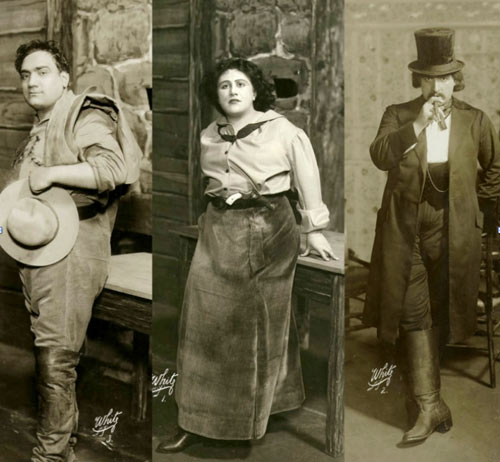 |
| Fanciulla del West's first cast (1910) |
From the outset of the opera, Puccini's orchestra is nervous in its bravado. Dark dissonances underlie many of the Act I interactions, and fragile, fragmented vocal lines contrast with ostensibly confident crescendos. The famously haunting lament for the miners' distant homelands unfolds not unlike an antiphonal psalm. At the end of the act, we are left with two narratives on a collision course. In one, the entire community hunts for the bandit chief and his men; in the other, that bandit chief is having a crisis of identity ("I don't know fully who I am..."). While Minnie looks forward in joy and fear to the development of romance, Johnson sees this as an opportunity which has already passed him by: "Ah, what we could have been!" Before the almost-lovers keep their appointment to meet again, Puccini takes the audience on what might seem a detour in the beginning of Act II, where we encounter the opera's Native American characters, Billy Jackrabbit and Wowkle. Billy is, alas, a racist caricature with very little individuality. Wowkle, however, is something more: a mother both tender and frazzled, and friend as well as servant to Minnie. And amid the first gusts of wintry wind, these two sing the fragment of a hymn: "Like a blade of grass are the days which the Lord has given unto man. Winter descends to the plain; man withers and dies." Just in case we missed it the first time, this final phrase is repeated thrice on a falling cadence:
This is, in fact, a misquotation: the biblical text says that it is the wind which passes over the plain. But in its altered form, this verse anticipates the nearly-deadly snow which comes later in the act. It is against this snow, whitening the plain, that Johnson's figure is instantly visible to the men who hunt him with guns. And lest we be tempted into complacency about his fate (after all, he's the tenor!) Puccini undermines our security at every turn. Johnson thinks he's going to die; Rance thinks he's going to die; Minnie's desperate cry--"You can't die!"--serves only to fix our minds on the possibility which she refuses to contemplate. The desperate poker game is scored by ostinato strings and ominous percussion; Minnie's delirious triumph is (sometimes audibly, as in the case of Deborah Voigt's assumption of the role at the Met) edged with terror. This man is hers: but he is marked with snow, sweat, dust, blood, unconscious and likely to die. And Puccini is not done with us. Again in Act III Johnson's entrance is deferred; we hear secondhand of his wild flight from the sheriff's posse. "He looked like a wolf surrounded by dogs!" says the reporter of ambiguous sympathies, which takes us to Psalm 22: Circumdederunt me canes multi, a text interpreted by medieval commentators as referring prophetically to Christ and his tormentors. And the stage directions confirm that Johnson gives his back to the smiters, and hides not his cheek from shame and spitting (cf. Isaiah 50:6.) Puccini is bold enough to give us nothing less than regeneration. When Minnie stands on the makeshift gallows, shielding Johnson/Ramerrez with her body, she bases her actions on a bold claim. "The bandit he was," she tells the miners, "died already, up there in my cabin. This man is mine as he is God's, and you cannot kill him." In the end, what Puccini gives us is the most human of miracles. Even Billy, though wordless, is made a sympathetic and vital actor in the denouement, and each of the miners who has given and received love recognizes that to deny it would be, in a deep sense, a guilty act. There is poignancy in the fact that Minnie and Ramerrez must leave the reach of the law to enjoy justice. Before doing so, however, they embrace the miners in full fellowship, as sisters and brothers in a community transformed by grace.
I found your perspective and your insights into this wonderful work very interesting! The funny thing, as an agnostic, is that I think I got to the same conclusions than you. But I guess that's what good art is about--you can make sense out of it no matter what your standing point is. Thank you for sharing your ideas!
ReplyDeleteAh - sorry I didn't see your comment earlier! Your point about the ideas of art is an intriguing one: that we both found Puccini's central claim about the big themes of the work, and found it moving, while arriving there by different routes. Thanks for joining the conversation!
DeleteHi Lucy, I recently experienced La Fanciulla for the first time (from Wien, on YouTube) and am reading everything I can on it. But it was not until we happened to have Psalm 51 in church this morning that I realised that Johnson's lines in Act II, 'sono un dannato ...naqui vagabondo, era ladro il mio nome da quando venni al mondo' are also a reference to lines from this psalm: 'behold, I was brought forth in iniquity and in sin did my mother conceive me'. This redemption theme is more closely ingrained into the opera than some would have it ...
ReplyDeleteThanks for your comment... I hadn't made that connection to Johnson's words! What a lovely additional way from him and Minnie to be connected. :)
Delete